The teenage siblings feeding thousands affected by the pandemic
After their out-of-the-box thinking helped curb the menace of single-use plastic and delivered tonnes of food and hygiene products to people, Jai and his brother Preet are now busy providing thousands meals to those affected by the Covid-19 crisis
It was two years ago that Jai Aswani had an idea – one that would positively impact his city’s landscape and environment not to mention the lives of hundreds if not thousands of people. To be fair, it was not the first time that the teenager had a plan that would benefit the community. But this one was different in that it would not only end up helping scores of less-privileged people but would also leave an impact on our ecosystem.
The then barely 15-year-old was returning home with his mother, Varsha, and younger brother Preet in their car after an awards ceremony in his honour (more about his awards later) when he saw scores of the discarded ubiquitous, single-use blue plastic bags sticking out like sore thumbs in Chennai, in the southern Indian state of Tamil Nadu.
While the sight of the discarded bags was not new, this time though the image stuck in the teenager’s mind and he began mulling over the issue of pollution the bags were causing and how he could reduce it in some way.
He remembered visiting an old-age home and a rehabilitation centre for mentally challenged women and seeing some residents busy stitching cloth bags. These were then sold to stores where they were used to pack groceries for customers who preferred the reusable, eco-friendly carrier bags to the plastic ones.
By the time he reached home, Jai had a plan.
“Mom,” he remembers asking his mother later at the dining table, “what if we get the women to make a lot more bags and we distribute them to groceries and small shops in the city.”
“But where will we get the material for the bags?” asked Varsha.
“I think I know of a few places,” he replied.
The next day, a school holiday, Jai set off to Savera Hotel, a 4-star 200-room hotel in the city and requested to meet the manager.
“Jai asked the management if they could give him pre-used hotel bedsheets. His plan was to hand over the sheets to the women who would convert them into shopping bags,” says Varsha, in a telephone interview from her home in Chennai.
The hotel management agreed and a few days later gave him a call to come by and collect some 100 bedsheets that were thoroughly washed, sanitised, ironed and neatly folded.
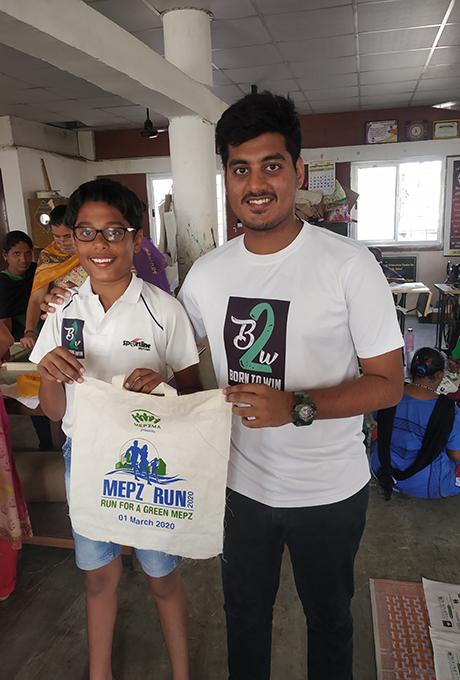
What would have gone to a landfill or a waste plant was going to get a new life.
Jai loaded the bedsheets into his mother’s car and requested her to drop them off to the old-age home where the women, pleased to get a fresh load of material, quickly got to work fashioning smart, white, sturdy, reusable grocery bags out of the sheets. Jai found that one bed sheet could be made into 20 bags.
A few days later, Jai returned to collect the bags which he then delivered to the groceries who paid him two to three Indian rupees per bag (the grocers would retail the bags for five rupees each). A proud Jai handed over the money he raised to the centres to be used for the women’s needs.
“I was so happy to be able to help the women and the rehabilitation centres in some way,” he says, by telephone from Chennai.
Bagging success in one of his first major initiatives, Jai wanted to do more. He scheduled meetings with managers of a few more hotels in the city and made presentations to them on how he planned to replace single-use plastic bags. He also roped in his brother Preet in the mission and together they began spreading the word. Soon, loads of pre-used bedsheets began landing up at the Aswani home.
“There was a time when hundreds of bedsheets, neatly washed and folded, would be lying in stacks all over the house – in bedrooms, the hallway, the entrance...,” says Varsha.
Jai identified a few more rehabilitation centres, visited them and told them his plan before handing over bundles of bedsheets to them to be converted into bags.
It did not take long for the young boy’s work to be noticed; one day a readymade garments manufacturer in the city gave him a call to say he would be willing to offer his facility for a couple of days to convert bedsheets to bags – for free.
“I was so happy when the uncle promised to make the bags,” says Jai.
The next month he was able to distribute more than 120,000 cloth bags to small-time grocers in the city.
Enthused by the initiative, a few large-hearted people in the city offered to foot the cost of the women’s efforts. The result: Jai could distribute the bags free of cost to grocers who were happy to use them to pack stuff for their customers.
“The hotels who supplied us with the bedsheets were happy because the old bedsheets were being put to good use and helping the environment; the women who made the bags were happy because they were earning well and did not have to struggle to get raw material; the stores were happy because the bags were sturdy and reusable; the customers were happy because these bags were reusable and non-polluting… and, in the end, Mother Earth too is happy because there is a lot less pollution,” says the teenager. “On average, each bag can replace 20 plastic bags. So imagine the amount of plastic that is being saved from going into landfills.”
Awards galore
Recognising the importance of Jai’s project, the Indian Coast Guard extended their support to the bag initiative and presented him with an award for his ‘contribution to society’ while the Coast Guard Wives Welfare Association helped distribute the bags to stores in the Andamans. Jai also received a letter of appreciation from the Indian Ministry of Tourism for this project.
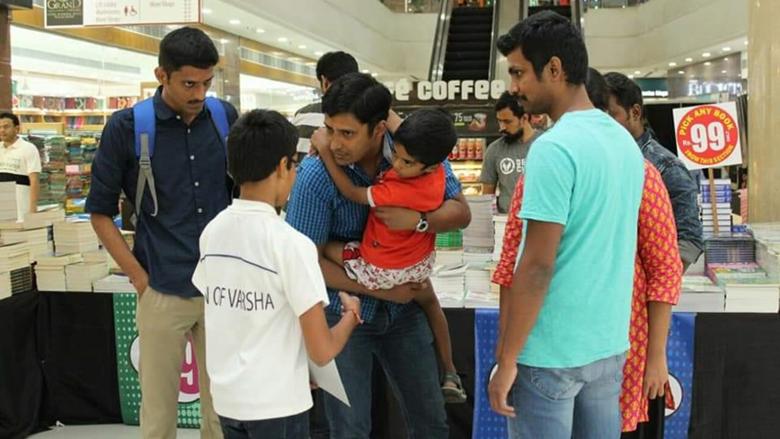
The Aswani brothers have been doing more than just reducing the amount of plastic going into landfills. One of their first community initiatives was in 2011 when Jai, fresh after attending a workshop on how loud noises of firecrackers can leave pets highly stressed, not to mention increase pollution levels, returned home to tell his parents that he would never again burst crackers – even during festive occasions. “I wanted to do my bit to help protect the environment including animals and birds,” he says.
Hoping to encourage more like-minded individuals to refrain from bursting crackers, the duo launched a ‘Say no to crackers’ campaign. They designed placards and banners and carried them around their housing community pleading with the residents to take a pledge against crackers.
“While a few hundred people took the pledge, there were a lot of people who did not subscribe to their views,” recalls Varsha. “They shooed away the boys insisting that some festivities mandated bursting of crackers.”
Although disappointed, the boys did not give up.
Their initiative was re-ignited when Jai, a sports lover – he is an emerging long-distance runner – joined a group called Kilpauk Striders, a chapter of Chennai Runners, a group of running enthusiasts. When he mentioned his plan to the team, they offered to join hands with the boys to take their message to more people. That worked. That year more than 5,000 people in and around their locality took a pledge not to burst crackers.
The initiative resonated with other charity groups in the city who picked up the message and began exhorting people to take the pledge. “Our teachers and even strangers encourage us a lot to do such initiatives,” says Jai, a student of Sindhi Senior Secondary School in Chennai.
Fired up with the success of their initiative, Jai wanted to do more. To give his projects proper direction and to better coordinate with supporters, a year later, in 2012, the two brothers started a non-profit called Born to Win.
“I chose that name because that’s my clan moniker in the [video game] Clash of Clans,” says Jai. Quite like the game that tasks players who are ‘chiefs of villages’ to build their own communities, Jai says the reason he created Born to Win is to bring together people of different walks of life to help make the world a better place to live in. “We can start by making small changes in our own communities,” he says.
While Jai is the founder, Varsha is the trustee and part of a team of nine members, including his brother Preet. “Our dream is a world without social challenges,” he says.
Rise4Rice campaign
Flushed with the success of his anti-firecracker campaign, Jai decided to launch an initiative to help struggling orphanages and old-age homes secure food grains for its residents. To that end, a few years ago he launched Rise4Rice, a programme to collect and distribute rice to the needy centres. “My plan was to collect five tonnes of rice in a month,” he says.
During school weekends, the duo would approach mall managements, large and small stores, schools and apartment complexes knocking on just about every door requesting donations in the form of rice. They also requested apartment authorities to allow them to place boxes on the premises where donors could deposit packets of grain. “We asked people to donate whatever amount of rice they could,” he says.
Before the end of the month the Born to Win team found that they had overshot their target. “We’d collected six tonnes of rice,” says Jai.
“It was while distributing the rice to the old-age homes that I saw the women there stitching bags and the idea of converting bedsheets to bags was born,” he says.
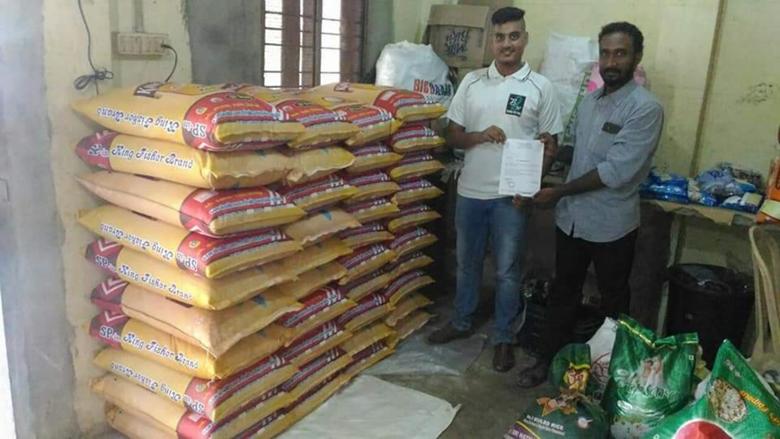
Jai not only does community initiatives but also helps raise funds for individuals. A few years ago, when he learnt that a visually challenged girl was in dire need of money for her medical expenses, he decided to do an inter-city run – from Puducherry to Chennai, a distance of around 150km – to raise funds for her medical expenses.
The run was to be completed over three days but for that he trained rigorously for more than three months. “I would do speed running, strength and light weight training including cycling for around 25km a day,” he says.
On D-day he began his run from Puducherry. Egging him on his mission was one of his mentors, model, actor and fitness promoter Milind Soman, who supported his initiative. “The training was tough and some days I had blisters on my feet,” he says. “There were several moments when I felt like giving up but during those moments I would ask myself why am I doing this? And the picture of the visually challenged girl would come to mind and that would spur me on to complete the marathon.”
Jai did, and in the process raised 300,000 rupees for the girl.
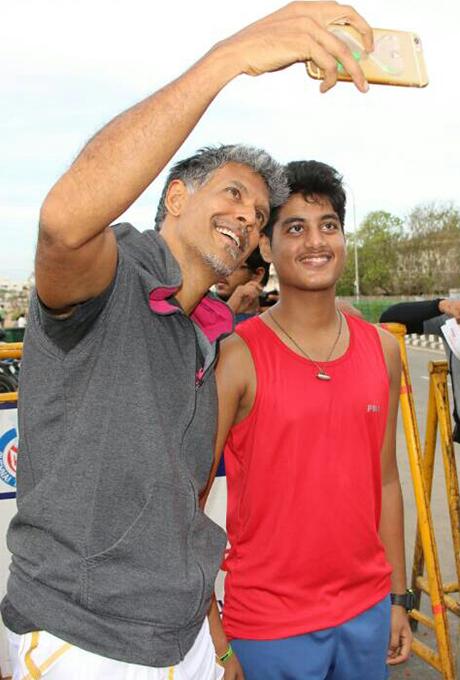
Milind is not his only mentor. “[Lt Governor of Puducherry] Kiran Bedi madam has also been constantly pushing me to do more initiatives. She is a pillar of support and has always lent a helping hand in almost all initiatives that I have done,” he says.
If three years ago Kiran supported Jai’s initiative to encourage people not to burst crackers, even organising a walkathon in Puducherry where more than 2,000 school children pledged not to burst crackers, last year she invited the teenager to address a gathering of students on how they can participate in initiatives to improve the community. Earlier this year, the lieutenant governor gladly accepted Jai’s invitation to unveil the logo of their charity Born to Win. “It was a great day for us to have Kiran Bedi madam do the honour,” says Varsha.
“Apart from Kiran Bedi ma’m, the other pillar of support is my mother,” says Jai. “Always ready to help us out – be it to drive somewhere to pick up things or to help us organise an initiative or act as a sounding board for my ideas – she never says no and always has the time for us.”
Varsha also handles the various WhatsApp groups for her son’s different initiatives. “At the moment I am the admin of some 17 groups,” she says.
Help in the time of crisis
The Covid-19 crisis has left the Born to Win team extremely busy. “We are arranging food for around 1,000 people every day,” he says. “We have also distributed around 30 tonnes of provisions to the needy in and around the city.”
Jai also organised a drive to collect and distribute female hygiene products. “We joined hands with a women’s organisation called Svacch and distributed 5,000 sanitary napkins for women who were unable to leave their homes to do purchases during the lockdown,” says Jai.
The team is also busy contacting old-age homes and rehabilitation centres requesting women there to make cloth masks that can be washed and reused. “We have already received the first batch of masks to be distributed to the poor people in the city,” says Varsha.
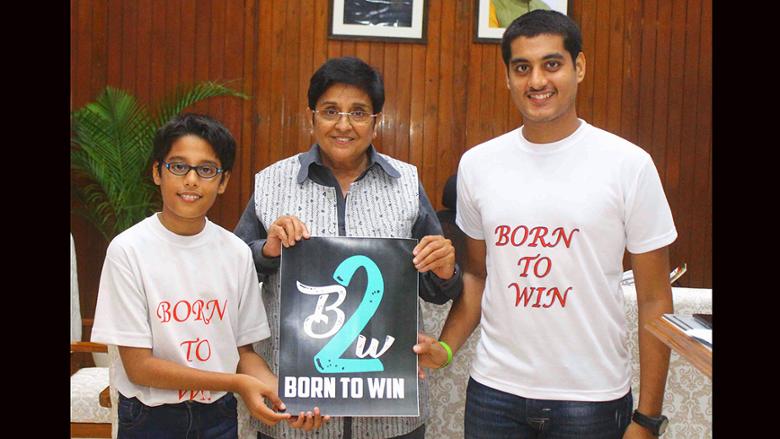
In the midst of the pandemic crisis, the teenager did not forget the four-legged friends. Realising the pet shelters were struggling for funds and pet food, Jai and his group got busy collecting and distributing pet food to pet shelters in the city. “We took all precautions and even though we did not step out of the house, arranged to distribute close to 1.5 tonnes of pet food,” he says proudly.
Jai, who also follows his other passion of sports, manages his time perfectly during the weekends and on school holidays to work on the initiatives. “The 3Ds that help me in my mission are determination, discipline and dedication,” he says.
Jai’s efforts have been rewarded; he has already received an armload of trophies and honours, including the Abdul Kalam Eco Friendly Award 2019, a crest from the Indian Coast Guard, The Rotary Youngest Achiever Award 2018-19, the Women’s Economic Forum Young Innovator Award 2018 and most recently a certificate from the state Health Minister Dr C. Vijayabhaskar, who appreciated the contribution of Born to Win in arranging hygiene products for women during the lockdown.
“Once the Covid crisis is over I’m planning to expand our efforts, including the Bedsheets to Bags initiative,” he says. “We need to just keep thinking out of the box.”